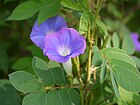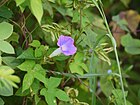Note: This is a project under development. The articles on this wiki are just being initiated and broadly incomplete. You can Help creating new pages.
Ipomoea nil
Ipomoea nil is a climbing, herbaceous annual or perennial plant producing stems that either twine into other plants for support or sprawl along the ground. The plant is gathered from the wild for local medicinal use.
Contents
- 1 Uses
- 2 Parts Used
- 3 Chemical Composition
- 4 Common names
- 5 Properties
- 6 Habit
- 7 Identification
- 8 List of Ayurvedic medicine in which the herb is used
- 9 Where to get the saplings
- 10 Mode of Propagation
- 11 How to plant/cultivate
- 12 Commonly seen growing in areas
- 13 Photo Gallery
- 14 References
- 15 External Links
Uses
Oedema, Oliguria, Ascariasis, Constipation, Mental disorders.[1]
Food
Ipomoea nil can be used in Food. Tender leaves are cooked as vegetable.[2]
Parts Used
[[:Category:Herbs with used in medicine|]], stem, leaves, Root.
Chemical Composition
Common names
| Language | Common name |
|---|---|
| Kannada | Gowri beeja |
| Hindi | Jharmaric |
| Malayalam | Taliyari |
| Tamil | |
| Telugu | Kollivittulu |
| Marathi | Kaladana |
| Gujarathi | |
| Punjabi | |
| Kashmiri | |
| Sanskrit | Kalanjani |
| English | Blue Morning Glory |
Properties
Reference: Dravya - Substance, Rasa - Taste, Guna - Qualities, Veerya - Potency, Vipaka - Post-digesion effect, Karma - Pharmacological activity, Prabhava - Therepeutics.
Dravya
Rasa
Guna
Veerya
Vipaka
Karma
Prabhava
Nutritional components
Hibiscus sabdariffa Contains the Following nutritional components like - Vitamin-A, Thiamine(B1), Riboflavin (B2), Niacin (B3), Pantothenic acid (B5), B6, C; Calcium, Iron, Magnesium, Manganese, Phosphorus, Potassium, Sodium, Zinc[2]
Habit
Identification
Leaf
| Kind | Shape | Feature |
|---|---|---|
Flower
| Type | Size | Color and composition | Stamen | More information |
|---|---|---|---|---|
| {{{5}}} |
Fruit
| Type | Size | Mass | Appearance | Seeds | More information |
|---|---|---|---|---|---|
Other features
List of Ayurvedic medicine in which the herb is used
Where to get the saplings
Mode of Propagation
How to plant/cultivate
The plant is not frost hardy, but can be grown outdoors as a tender annual in temperate zones[5]. Ipomoea nil is available through August to November[2].
Commonly seen growing in areas
Thickets, Waysides, Fields, Hedges.
Photo Gallery
References
- ↑ Indian Medicinal Plants by C.P.Khare
- ↑ 2.0 2.1 2.2 "Forest food for Northern region of Western Ghats" by Dr. Mandar N. Datar and Dr. Anuradha S. Upadhye, Page No.96, Published by Maharashtra Association for the Cultivation of Science (MACS) Agharkar Research Institute, Gopal Ganesh Agarkar Road, Pune
- ↑ [Chemistry]
- ↑ [Morphology]
- ↑ Cultivation
External Links
- Ayurvedic Herbs known to be helpful to treat Oedema
- Ayurvedic Herbs known to be helpful to treat Oliguria
- Ayurvedic Herbs known to be helpful to treat Ascariasis
- Ayurvedic Herbs known to be helpful to treat Constipation
- Ayurvedic Herbs known to be helpful to treat Mental disorders
- Herbs with used in medicine
- Herbs with stem used in medicine
- Herbs with leaves used in medicine
- Herbs with Root used in medicine
- Herbs with common name in Kannada
- Herbs with common name in Hindi
- Herbs with common name in Malayalam
- Herbs with common name in Telugu
- Herbs with common name in Marathi
- Herbs with common name in Sanskrit
- Herbs with common name in English
- Habit - Annual climber
- Index of Plants which can be propagated by Seeds
- Herbs that are commonly seen in the region of Thickets
- Herbs that are commonly seen in the region of Waysides
- Herbs that are commonly seen in the region of Fields
- Herbs that are commonly seen in the region of Hedges
- Herbs
- Pages without herbs images






